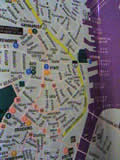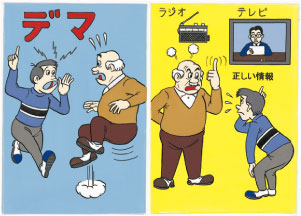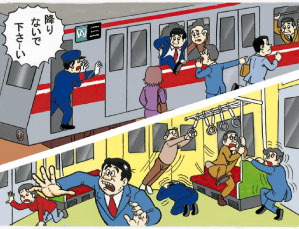






|

|
Morioka's personal diary
If you have any comments please use our feedback form.
Please visit our blog. |
 |
I have been busy for the last two weeks. I couldn't post a new entry until today. Yesterday I attended an annual conference of the Japanese DPI (Didabled Peoples' Internatinal) to serve as a discussant at a special panel discussion about the value of life. Other discussants were Shinya Tateiwa, Professor at Ritsumeikan University, Misao Hashimoto, President of the Japanese ALS Association, Hiroshi Kataoka, President of the Aoishiba (cerebral palsy) Group, Yumiko Kawaguchi, Director of the Japanese ALS Association, and Shoji Nakanishi, Committee Member of the Japanese DPI. It is surprising that such splendid guests got together and had a discussion about disability and the value of life. Personally, the most impressive participant was Misao Hashimoto. She was an ALS patient and could not move her body except for some facial muscles. She expressed her inner voices with a subtle movement of eyebrows and eyelids, and those movements were "translated" by her daughter.
I will write about this conference in the next post.
Photo: Books in my office.
What's New: Nothing.
Post a comment / See comments (Blog) |
 |
ASBH summer conference, "Bioethics & Politics:
The Future of Bioethics in a Divided Democracy," will be held in Albany, New York, USA, July 13-14.
Please visit the conference page, then you can find the names of well-known American bioethicists. I have submitted an abstract for this conference, and today I received a letter of invitation from them. I will fly to Albany and give a 20 minute talk. I have not prepared for my presentation at all. The following is the abstract I sent to them:
How to Reconcile Liberal and Conservative Bioethics: A Japanese Philosopher’s View of the American Controversy
Masahiro Morioka (Professor, Osaka Prefecture University, Japan)
It might be interesting to see the current controversy from outside the US. In Japan, where the percentage of Christians is lower than 1% of the whole population, the “conservative” argument, such as the restriction of advanced medical technologies and the ban on selective abortion, has been put forward mainly by “left-wing” academicians, citizen activists and feminists, not by political or religious conservatives. This implies that conservative “wisdom” could also be developed by people outside “conservative” circles.
A highly politicized liberal/conservative dichotomy is fruitless. We should reconcile the both sides. Eric Cohen stresses the importance of searching for “wisdom in those puzzling human situations where wisdom is most needed” (HCR, 36-1, 2006). I totally agree with his statement because this is the role of philosophy in contemporary society, but at the same time, it should be needed to release their wisdom from the framework or dogma of the Judeo-Christian traditions.
We should learn from liberals the values of “liberal society,” where the various ways of life are respected as much as possible. However, we have to be wise enough to see through the long run side-effects caused by selection of human life and enhancement technologies in a free society. I would like to use the term “fundamental sense of security” and think about how to maintain “wisdom” in a pluralistic society.
Well, this is a summary of what I have been thinking about "bioethics and politics," and some of my opinions on this topic are found in my former posts in this blog. I am not sure whether an American audience will be interested in a presentation made by a Japanese philosopher, but anyway, this will be a great opportunity to send a message of "life studies" to American bioethicists, and participants in the conference.
Photo: A map in my office.
What's New: Nothing.
Post a comment / See comments (Blog) |
 |
I am now thinking about what is "conservative bioethics" in Japan. In the US this term means a kind of ethics that seeks to protect the value of human life, particularly that of fetuses and fertilized eggs, and this ethics is strongly endorsed by Christian circles. In Japan, the ratio of Christians is lower than 1% of the whole population. Christianity does not have enough political power to influence the country's social policies.
In the 1960s and 70s, the Japanese government (led by the Liberal Democratic Party) sought to reduce women's right to abortion (abortion has been considered legal since 1948). The Diet members who emphasized the dignity of fetuses and respect for human life were those who elected by the support of Seichou no Ie, a new religion of Shintoism. In this sense, during this period, we could say Japanese conservative bioethics was supported by Shintoism. Shintoism played a similar role to that of Christianity in the US.
However, we witness a completely different political stuation concerning therapeutic human cloning in the 1990s. While the ruling Liberal Democratic Party sought to approve the production of a cloned human embryo for therapeutic purposes, the opposition party, the Democratic Party of Japan, objected to the production of such an embryo because a human embryo is the "sprout of human life," and we should respect human embryos as much as possible. Here we encounter the reversal of the situation. Respect for human embryos was not proposed by the ruling conservative party, but proposed by the opposition "left-wing" party (Of course we have a variety of discussions over whether the Democratic Party of Japan is "left-wing"). The main reason why the Liberal Democratic Party supported therapeutic human cloning was that it serves Japan's national interests. Religions did not play an important role here.
We might say that "money" played an important role here, and for the Japanese money has become a new "religion." Contemporary Japanese conservative bioethics is motivated by the pursuit of "money." Making money and creating an economically strong nation might be the most important value in Japanese conservative circles.
Photo: Restaurant Hokkyokusei, Osaka.
What's New: Nothing.
Post a comment / See comments (Blog) |
 |
In the post of May 8, 2006, I talked about racist cartoon images in a booklet distributed by the Tokyo Metropolitan Government. (I found this information on the SistainTokyo blog.) I distributed the information to my friends. Then, one of my friends forwarded it to Fumio Takano, the director of Tokyo Alien Eyes, a non profit organization set up for the purpose of supporting foreign students in Tokyo. He sent a letter to Tokyo Metropolitan Police Department and asked them to redraw the racist cartoon images in a booklet. Then he received a letter saying that they redrew the pictures and uploaded to their website. The following are samples of their new cartoons.
Old cartoon:

Revised one:

Old cartoon:

Revised one:

Well, what do you think? Personally, I appreciate their immediate responses. I would like to know how the original cartoonist thinks about this revision.
You can see the revised cartoons on the website of Tokyo Metropolitan Police Department:
http://www.keishicho.metro.tokyo.jp/foreign/quake/preface.htm
Photo: Blue sky.
What's New: .
Post a comment / See comments (Blog) |
|
